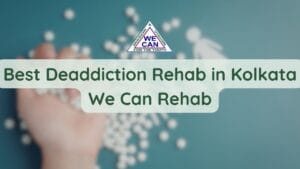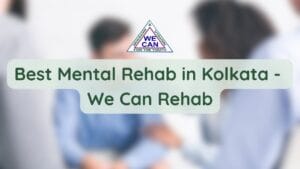Drugs and other forms of addiction pose a serious threat to a nation’s stability by harming its citizens from within. In India, this issue is no longer confined to major metropolitan areas; even smaller cities and towns in West Bengal are increasingly affected by drug abuse. This has created a critical need for professional drug treatment centre in West Bengal.
We Can Rehab is actively working to address this challenge by helping young people in West Bengal avoid a path of destruction. Therefore, in this blog, we will go over the severe danger drugs pose and how we are actively helping individuals to fight it. Recently, a Comprehensive National Survey came out that covers extent and pattern of substance use in India which was carried out in 2018.
| Name of the substance | Estimated Number of Users(Age 10-17 Years) | Estimated Number of Users(Age 18-75 Years) |
|---|---|---|
| Alcohol | 30,00,000 | 15,01,16,000 |
| Cannabis | 20,00,000 | 2,90,18,000 |
| Opioids | 40,00,000 | 1,86,44,000 |
| Sedatives | 20,00,000 | 1,05,80,000 |
| Inhalants | 30,00,000 | 51,25,000 |
| Cocaine | 2,00,000 | 9,40,000 |
| Amphetamines Type Stimulants(ATS) | 4,00,000 | 15,47,000 |
| Hallucinogens | 2,00,000 | 11,01,000 |
How Bad is the Situation of Drugs Abuse in India and West Bengal?
The situation of substance abuse in West Bengal is a significant public health issue. According to various studies and reports, the prevalence of substance use and the lack of adequate infrastructure for treatment highlight a major crisis. On top of that, there is a persistent prejudice on the topic that makes it hard for people to seek medical attention.
Furthermore, a considerable portion of the population is affected by mental health conditions and addiction. Statistics show that chronic alcoholism impacts approximately 25 out of every 1,000 people, while 15 out of every 1,000 individuals are drug users. In addition, over 10% of the population struggles with psychiatric conditions like depression and psychosis.
A critical challenge is the significant shortage of psychiatric and de-addiction beds, with availability at only 20% of the required capacity. This has led to a major infrastructure deficiency, making it difficult for those in need to access proper inpatient care. Indian hospitals simply does not offer adequate infrastructure to help individuals struggling with drug abuse.
Trends in West Bengal According to the Best Drug Treatment Centre in West Bengal
Growing Youth Addiction: Recent reports indicate a concerning trend of increasing alcohol consumption. Which was found higher among young adults in urban centres of West Bengal, like Kolkata. This has led to a rise in liver diseases among professionals in the 25-35 age group. Many of whom now require consistent medical care for dependence.
Variety of Substances: While alcohol is a primary concern, the state also faces issues with other substances. A community-based study in West Bengal found that “brown sugar” (a form of heroin) is a common drug of abuse in urban areas, while alcohol remains prevalent in rural regions. Poly-drug abuse is also a common occurrence.
Early Onset: A troubling trend is the young age at which individuals start using substances. Many drug users begin before the age of 20, with peer pressure and family history being key contributing factors. The situation calls for a multi-pronged strategy to increase access to treatment facilities. We Can Rehab is raising public awareness about mental health and addiction.As well as providing comprehensive support and resources to those affected.
| Name of the substance | Prevalence of use w.r.t survey 2004(Age Group 12-60 years) | Prevalence of use w.r.t survey 2018(Age Group 10-75 years) |
|---|---|---|
| Alcohol | 21% | 14.6% |
| Cannabis | 3% | 2.83% |
| Opiates/Opioids | 0.7 | 2.1% |

How does a Drug Treatment Centre in West Bengal Makes the Situation Better?
Before we present how We Can Rehab makes the the dire situation better, we need to have an idea about the situation itself. First of all, drug use comes with a host of serious risks. They can have severe, long-lasting effects on a person’s life, and it’s crucial to understand them. Let us look at some of those dangers below:
- Addiction: Consistent drug use can fundamentally change the brain’s function and structure. This leads to compulsive use, making it incredibly difficult to stop, even when a person knows it’s causing them harm.
- Health Issues: Different drugs and how they’re used can cause a wide range of health problems, from organ damage and respiratory issues to mental health disorders and a higher risk of infections.
- Overdose Risks: Consuming too much of a drug, particularly opioids, can be fatal. An overdose can lead to severe respiratory depression, coma, or death.
- Accidents & Injuries: When someone is under the influence, their judgment and coordination are impaired, which significantly increases their risk of being involved in accidents or suffering injuries.
- Legal Consequences: The possession and use of many drugs are illegal, which can lead to serious legal trouble, including arrests, fines, or imprisonment.
- Social Struggles: Drug abuse often damages relationships with family and friends and can negatively impact a person’s performance at school or work.
How Does We Can Rehab Perform as the Best Drug Treatment Centre in West Bengal?
Drug treatment facilities in West Bengal are crucial for recovery. While medical care addresses the immediate physical issues of drug abuse, our rehabilitation centre in West Bengal offers long-term support to help people rebuild their lives. We Can Rehab serves as a beacon of hope, providing personalized support from skilled professionals who guide individuals through their recovery journey.
- Personalized Care: Our qualified staff creates treatment plans specifically tailored to each person’s unique needs and circumstances.
- Supportive Environment: We provide a safe and encouraging space where individuals feel valued and respected as they work through their recovery.
- Resources and Education: Our centre offers essential information and resources that empower individuals to make informed decisions about their health and well-being.
- Long-Term Recovery: With our consistent support and encouragement, individuals can regain control of their lives and focus on achieving their long-term recovery goals.
We are dedicated to making a meaningful difference in the lives of those struggling with addiction. By treating every person with respect and sincerity, we build a strong support system that fosters positive transformation.
We Can Rehab is Making a Positive Impact
Dedication to creating a safe and compassionate environment is commendable. We provide care that addresses the mind, body, and spirit. Promoting a holistic approach that has proven highly effective in helping individuals overcome addiction. By focusing on evidence-based treatments and empathy. We not only empower people to regain control of their lives. But also work to eliminate the stigma associated with addiction and mental health challenges.
Our programs are designed to nurture every aspect of a person’s well-being, focusing on physical health, mental clarity, and emotional stability. These initiatives emphasize empathy and compassion. Ensuring that individuals feel understood and supported throughout their recovery journey. By offering respectful, non-judgmental care. We contribute to reducing the stigma around addiction and mental health. Additionally, by fostering a strong community where individuals can heal together, we provide a vital support network for long-term recovery.
Have a Look at We Can Rehab’s Treatment Approach
At We Can Rehab, we treat addiction as a serious health issue in a compassionate and supportive environment. Our goal is to ensure every individual receives empathetic care throughout their entire recovery journey, from initial detoxification to long-term healing.
We understand that a one-size-fits-all approach doesn’t work. That’s why we create personalized treatment plans tailored to each person’s unique needs. These plans combine natural remedies, medication-assisted therapy, and both group and individual counseling.
Our Commitment to Holistic and Evidence-Based Care
We prioritize evidence-based practices, using clinically proven techniques and the latest research in addiction treatment. Our experienced professionals stay up-to-date to provide the best possible care. Because addiction affects both physical and emotional well-being. So, we integrate activities like meditation, exercise therapy, and nutritional counseling to promote a holistic recovery.
Long-Term Support and Community
Overcoming addiction is a lifelong commitment, which is why we offer ongoing support through various resources and support groups. Our services ensure that individuals stay on track even after completing our program. Rebuilding connections with others is vital for healing. Our centre provides a secure space where people with shared experiences can support one another. Fostering a strong community for long-term recovery.
Conclusion
We Can Rehab is dedicated to tackling the issue of drug abuse in our nation. We recognize the profound damage it inflicts on our youth and their future. The rising number of tragedies caused by substance abuse. Along with the stigma and societal rejection faced by its victims, only makes their challenges worse. As a leading drug treatment centre in West Bengal, we are proactive in addressing this crisis. With empathy and expertise, we help individuals return to a normal life. Understanding each person’s unique needs and treating them with compassion and dignity.
FAQs
- What types of addiction do you treat?
- We treat a wide range of addictions, including substance abuse like alcohol and drugs, as well as behavioral addictions such as gambling. We create a personalized treatment plan for each individual’s specific needs.
- What is your treatment approach?
- Our approach is holistic and evidence-based. We combine medically supervised detox and pharmacological treatments with behavioral therapies (like CBT). As well as holistic practices (meditation, exercise), and long-term aftercare to support a full recovery.





